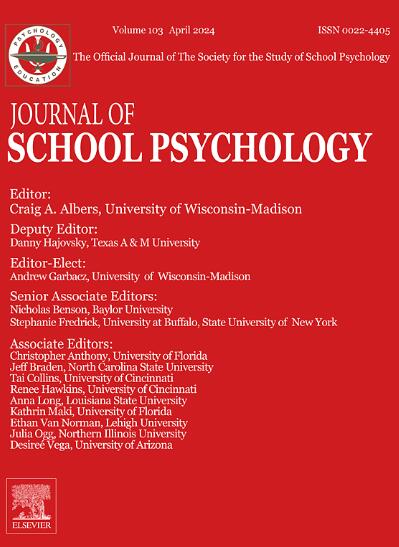Evaluating diversity training in schools: A narrative review of different measurement approaches
IF 4.1
1区 心理学
Q1 PSYCHOLOGY, SOCIAL
引用次数: 0
Abstract
Educational leaders have enacted diversity training as a result of persistent racial disparities in educational outcomes. Diversity training is defined as professional development aimed at promoting inclusive attitudes, beliefs, and behaviors among school staff. Despite the widespread implementation of diversity training, research suggests that these trainings are often not evaluated in rigorous or meaningful ways. We provide a narrative review of the multi-disciplinary literature that takes stock of the measurement approaches that could be used to effectively evaluate school-based diversity training. Specifically, this integrative empirical review spans a variety of approaches, including qualitative, self-report, implicit attitudes, vignettes of student behavior, observational, and student-level data. We provide a comprehensive synthesis of the strengths and weaknesses of these measurement strategies by evaluating the extent to which they center the perspectives of students from minoritized groups and are relevant to promoting educational equity. We present a critique within and across different study outcomes as well as implications for advancing research and practice with school-based diversity trainings. Our review reaffirmed the need for more research evaluating diversity training within schools across a variety of different outcomes. Such evaluations will ideally be planned with the school context in mind, driven by a strong theory of change, informed by an understanding of the strengths and limitations of a given measurement approach, and guided by the anti-racist goals that initially motivated diversity training implementation.
评估学校的多样性训练:不同测量方法的叙述性回顾
由于教育成果中持续存在的种族差异,教育领导人制定了多元化培训。多样性培训被定义为旨在促进学校员工包容态度、信仰和行为的专业发展。尽管多元化培训得到了广泛的实施,但研究表明,这些培训往往没有得到严格或有意义的评估。我们提供了多学科文献的叙述性回顾,这些文献对可用于有效评估基于学校的多样性培训的测量方法进行了评估。具体来说,这一综合实证研究涵盖了多种方法,包括定性、自我报告、内隐态度、学生行为的小片段、观察和学生水平的数据。我们通过评估这些测量策略在多大程度上以少数群体学生的观点为中心,并与促进教育公平有关,从而全面综合了这些测量策略的优缺点。我们对不同的研究结果进行了批评,并对推进以学校为基础的多样性培训的研究和实践提出了建议。我们的回顾重申了需要进行更多的研究,以评估学校内各种不同结果的多样性培训。理想情况下,这样的评估应该考虑到学校的背景,在强有力的变革理论的推动下,在对给定测量方法的优势和局限性的理解的指导下,在最初推动多样性培训实施的反种族主义目标的指导下进行。
本文章由计算机程序翻译,如有差异,请以英文原文为准。
求助全文
约1分钟内获得全文
求助全文
来源期刊

Journal of School Psychology
PSYCHOLOGY, EDUCATIONAL-
CiteScore
6.70
自引率
8.00%
发文量
71
期刊介绍:
The Journal of School Psychology publishes original empirical articles and critical reviews of the literature on research and practices relevant to psychological and behavioral processes in school settings. JSP presents research on intervention mechanisms and approaches; schooling effects on the development of social, cognitive, mental-health, and achievement-related outcomes; assessment; and consultation. Submissions from a variety of disciplines are encouraged. All manuscripts are read by the Editor and one or more editorial consultants with the intent of providing appropriate and constructive written reviews.
 求助内容:
求助内容: 应助结果提醒方式:
应助结果提醒方式:


